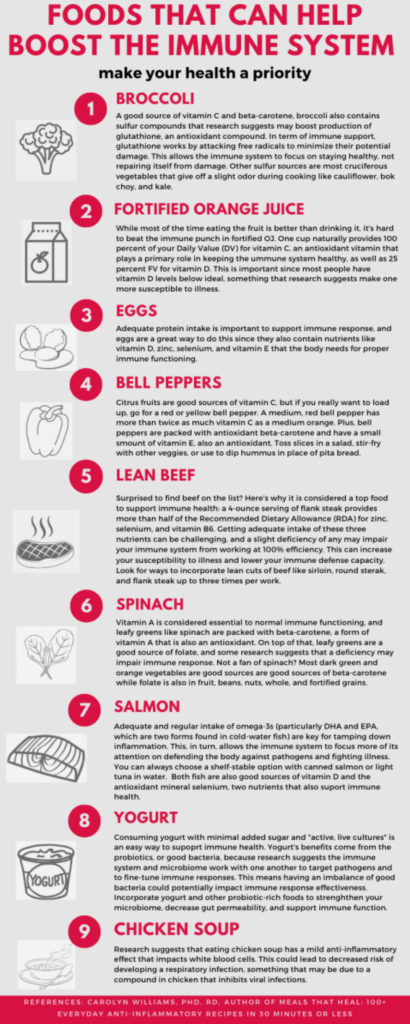SHELBY BRAWNER, EXTENSION SPECIALIST
Foods That Can Help Boost the Immune System
Make your health a priority.
Broccoli
A good source of vitamin C and beta-carotene, broccoli also contains sulfur compounds that research suggests may boost production of glutathione, an antioxidant compound, in terms of immune support, glutathione works by attacking free radicals to minimize their potential damage. This allows the immune system to focus on staying healthy, not repairing itself from damage. Other sulfur sources are most cruciferous vegetables that give off a slight odor during cooking like cauliflower, bok choy, and dale.
Fortified Orange Juice
While most of the time eating the fruit is better than drinking it, it’s hard to beat the immune punch in fortified LJ. One cup naturally provides 100 percent of your Daily Value (DV) for vitamin C, an antioxidant vitamin that plays a primary role in keeping the immune system healthy, as well as 25 percent FV for vitamin D. This is important since most people have vitamin D levels below ideal, something that research suggests makes one more susceptible to illness.
Eggs
Adequate protein intake is important to support immune response, and eggs are a great way to do this since they also contain nutrients like vitamin D, zinc, selenium, and vitamin E that the body needs for proper immune functioning.
Bell Peppers
Citrus fruits are good sources of vitamin C, but if you really want to load up, go for a red or yellow bell pepper. A medium, red bell pepper has more than twice as much vitamin C as a medium orange. plus, bell peppers are packed with antioxidant beta-carotene and have a small amount of vitamin E, also an antioxidant. Toss slices in a salad, stir-fry with other veggies, or use to dip hummus in place of pita bread.
Lean Beef
Surprised to find beef on the list? Here’s why it is considered a top food to support immune health: a 4-ounce serving of flank steak provides more than half of the Recommended Dietary allowance (RDA) for zinc, selenium, and vitamin B6. Getting adequate intake of these three nutrients can be challenging, and a slight deficiency of any may impair your immune system from working at 100% efficiency. This can increase your susceptibility to illness and lower your immune defense capacity. Look for ways to incorporate lean cuts of beef like sirloin, round steak, and flank steak up to three times per week.
Spinach
Vitamin A is considered essential to normal immune functioning and leafy greens like spinach are packed with beta-carotene, a form of vitamin A that is also an antioxidant. On top of that, leafy greens are a good source of folate, and some research suggests that a deficiency may impair immune response. Not a fan of spinach? Most dark green and orange vegetables are good sources of beta-carotene while folate is also in fruit, beans, nuts, whole, and fortified grains.
Salmon
Adequate and regular intake of omega-3s (particularly DHA and EPa, which are two forms found in cold-water fish) are key for tamping down inflammation. This, in turn, allows the immune system to focus more of its attention on defending the body against pathogens and fighting illness. You can always choose a shelf-stable option with canned salmon or light tuna in water. Both fish are also good sources of vitamin D and the antioxidant mineral selenium, two nutrients that also support immune health.
Yogurt
Consuming yogurt with minimal added sugar and “active, live cultures” is an easy way to support immune health. Yogurt’s benefits come from the probiotics, or good bacteria, because research suggests the immune system and microblome work with one another to target pathogens and to fine-tune immune responses. This means having an imbalance of good bacteria could potentially impact immune response effectiveness. Incorporate yogurt and other probiotic-rich foods to strengthen your microbiome, decrease gut permeability, and support immune function.
Chicken Soup
Research suggests that eating chicken soup has a mild anti-inflammatory effect that impacts white blood cells. This could lead to decreased risk of developing a respiratory infection, something that may be due to a compound in chicken that inhibits viral infections.
References – Carolyn Williams, PHD., RD. Author of Meals that Heal: 100-everyday Anti-Inflammatory Recipes in 30 Minutes or Less

